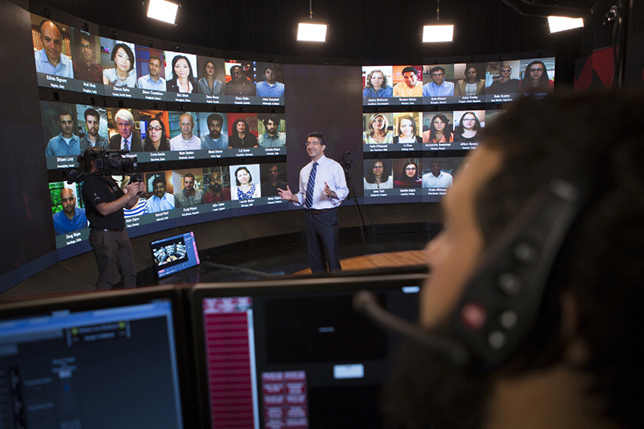HBX Intros HBX Live Virtual Classroom

HBX Live's virtual amphitheater (PRNewsFoto/Harvard Business School)
Harvard Business School's HBX digital learning initiative today launched a virtual classroom designed to reproduce the intimacy and synchronous interaction of the case method in a digital environment. With HBX Live, students from around the world can log in concurrently to participate in an interactive discussion in real time, guided by an HBS professor.
Built to mimic the amphitheater-style seating of an HBS classroom, the HBX Live Studio features a high-resolution video wall that can display up to 60 participants. Additional students can audit sessions via an observer model. An array of stationary and roaming cameras capture the action, allowing viewers to see both the professor and fellow students.
"Everything in the HBX Live Studio was designed to recreate the magic of the Harvard Business School case method classroom," said Youngme Moon, senior associate dean for strategy and innovation at HBS, in a statement. "We then layered on some additional features to bolster the learning model even further. The result is a deeply immersive and engaging experience that allows participants from around the globe to interact in a highly kinetic way."
The HBX Live launch comes on the heels of HBX's introduction of HBX CORe, an online program that teaches the fundamentals of business to college students and recent workforce hires, as well as Courses, a portfolio of online learning programs for senior managers. Both CORe and Courses are delivered through the HBX online learning platform.
The first students to experience HBX Live include:
- HBS Executive Education and Corporate Learning participants, who participated in HBX Live sessions while between on-campus modules and back at work;
- HBS alumni in a two-session pilot on leadership; and
- HBX CORe students, who used the facility to interact in real time with faculty and peers.
Faculty and student feedback has been positive. For example, 96 percent of the HBS alumni who took part in the initial session said they wanted to participate in HBX Live again, citing the platform's ability to transcend geographical boundaries.
"The energy my faculty colleagues and I can feel in the studio from students located around the world is incredible, and the interaction with participants is seamless and impressive," said Bharat Anand, faculty chair of HBX, in a statement. "As a result, we are exploring the use of the HBX Live facility for a variety of new purposes, from case-based teaching in virtual executive programs to research activities."
Planned uses of HBX Live this fall include a pilot of virtual research seminars that connect faculty from different universities, as well as a project session for HBS's U.S. Competitiveness Project, which studies the competitiveness of the United States in the world economy.
About the Author
Rhea Kelly is editor in chief for Campus Technology, THE Journal, and Spaces4Learning. She can be reached at [email protected].